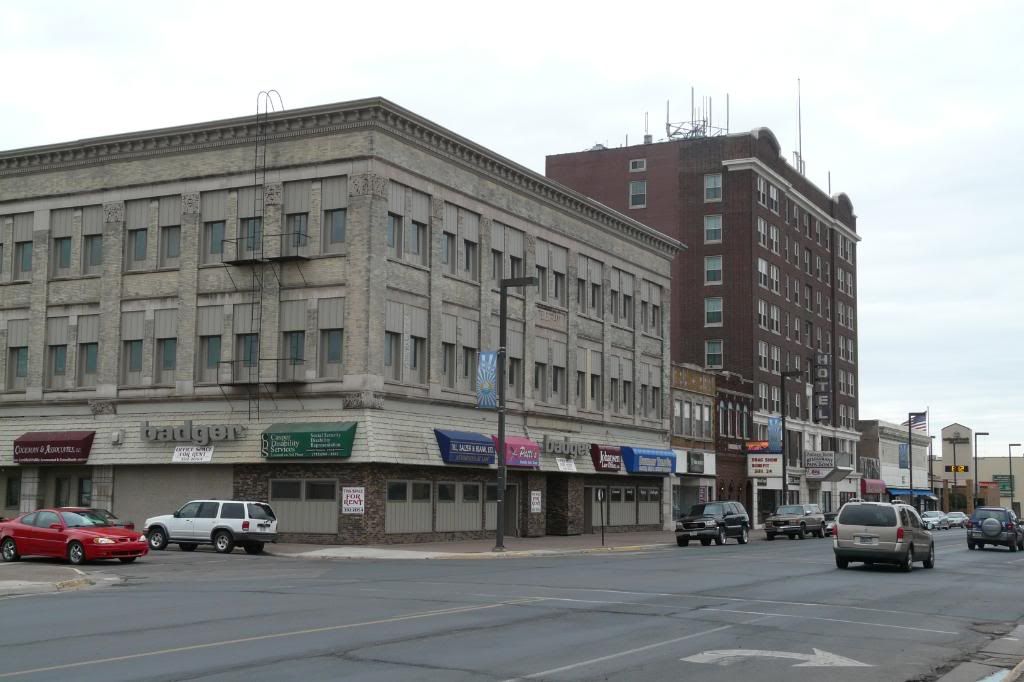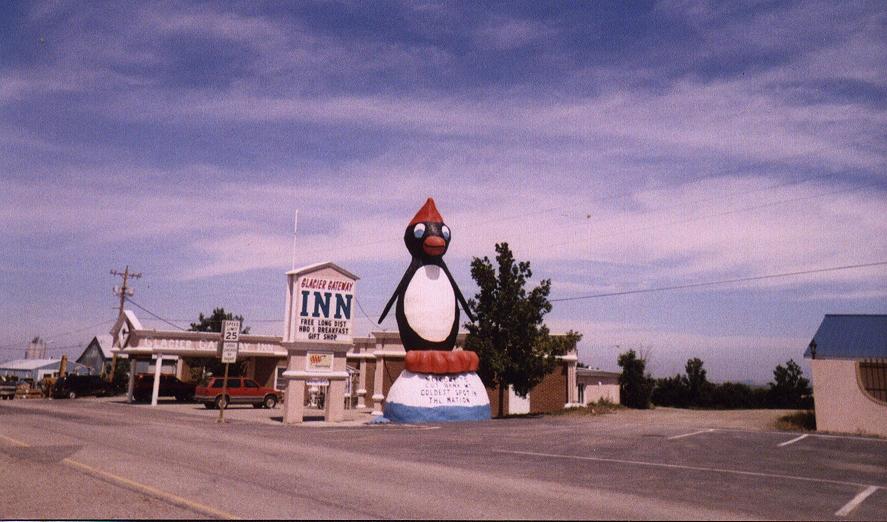Blue Highways: Superior, Wisconsin
Unfolding the Map
 We have crossed into Wisconsin, a state with which I am very familiar, as we continue our eastward trek with William Least Heat-Moon through the northern part of the U.S. We'll breeze through Superior on our way south into America's Dairyland. To find Superior, look at the map!
We have crossed into Wisconsin, a state with which I am very familiar, as we continue our eastward trek with William Least Heat-Moon through the northern part of the U.S. We'll breeze through Superior on our way south into America's Dairyland. To find Superior, look at the map!
Book Quote
"On Superior Street I ate smoked cisco, then crossed the bridge above St. Louis Bay into Superior, Wisconsin, then down broad and empty Belknap Street running from the ore docks past old walk-ups and corner taverns, on to route 35, and out of the city."
Blue Highways: Part 7, Chapter 11
 Downtown Superior, Wisconsin. Photo by "Thundertubs" and posted at Skyscraperpage.com. Click on photo to go to host page.
Downtown Superior, Wisconsin. Photo by "Thundertubs" and posted at Skyscraperpage.com. Click on photo to go to host page.
Superior, Wisconsin
Wisconsin is special to me for many reasons. For the first 22 years of my life, I was a California boy. I rarely left California. In fact, the only time I was outside of California in that time was in 1979, when my parents decided to take advantage of cheaper prices and bought a cruise to Alaska out of Vancouver, British Columbia, for our family.
An interesting side note to that trip - when we took the cruise the Soviet Union had just begun to occupy Afghanistan and the ship we were to take, the M.V. Odessa, was a Soviet-flagged cruise ship with a huge hammer and sickle on the smokestack! As a result, our vacation was not as cool as it was supposed to be, because the U.S. shut off ports and the iconic Glacier Bay to our ship except for the port of Skagway, Alaska. All we could do was cruise om and out of the Western Canada fjords (which we could do because the ship had side screws allowing it to turn 180 degrees in one place). I developed a heavy crush on our Russian meal server, Larisa (who kissed me when I left! My heart still flutters remembering that!).
But I digress. After college, I joined the Jesuit Volunteer Corps, and moved to Milwaukee, Wisconsin. I lived there for nine years. To date, besides California, I haven't lived anywhere else for a longer period of time. 22 years in California, nine years in Wisconsin, seven years (and counting) in New Mexico, six years in Texas, four years in Louisiana. I anticipate, barring a complete life change, that my years in New Mexico will overtake Wisconsin sometime, but Wisconsin will remain special to me because it was my first break with what I knew. Wisconsin gave me a chance to discover myself, address issues I never knew I had, provided opportunities for personal growth, and introduced me to new challenges. Without Wisconsin, I would have never developed the adventure for travel and exploration that I did. I wouldn't have thought about living anywhere else outside of California if I had not taken that step to live in Milwaukee's inner-city, volunteer in an inner-city school and for unemployed people, and make it my home. It was a home that was very difficult to leave when I eventually did, and I still look back upon the state with a lot of fondness and wistfulness.
One thing I remember about Wisconsin, and Milwaukee in particular, is the corner tavern. LHM mentions the corner taverns in Superior in his quote. I don't know if Superior is like Milwaukee, but in Milwaukee you could live anywhere within the city, it seemed, and be steps away from a corner tavern. In Wisconsin you'd see Pabst, Schlitz and Old Style signs beckoning you into the smokey environment within. When I walked into a corner tavern, there was often four or five people at the bar, maybe 2 together and the rest drinking alone. Sometimes there might be someone playing pool, darts, shuffleboard or some other gaming amusement for the patrons. A TV might be on in the corner, showing the Bucks, Brewers or Packers, but silent, to make way for music from a jukebox. Or the place might be silent save for the clink of the glasses. What was a mystery to me was how these places stayed in business, because if I went back even months later, often the same patrons were there, and nobody else save for the one non-regular guy like me who was just looking to duck in and have a beer.
It didn't matter in the neighborhoods I lived in whether I went out my door and turned right or left. At the end of any corner was the tavern. It was a bar, but it was always more depending on what you needed. It could be a shelter from the weather, a place to bide your time if you needed a place away, a psychotherapist's office if you needed to talk to someone, a place to meet friends, a place to meet potential dates, a place to forget the troubles of the world, or a place to rail about the troubles of the world with perhaps a sympathetic ear. It was a place for politics, for religion, for love, and sometimes a place for anger and fighting.
Another thing I remember about Wisconsin was how guarded people were about themselves. You could tell that Northern Europeans were the main early settlers of the state because everyone tended to avoid outbursts of emotion and anger, and were hard to read. I didn't think about it much while I lived there, but it only made an impression on me when I had lived in Texas and New Orleans for awhile. Texans are big and boisterous, filling up the space around them because there is so much of it and so much of them. New Orleanians are outgoing and industrious people with an opinion on everything. Ask a New Orleanian about the New Orleans Saints, the local professional football team, and you're in a for an hour-long discourse on everything that is good and bad about the team, detailed opinions on what the coach did well or did wrong, and prognostications on what will happen in the rest of the season or next year.
In contrast, we visited Door County, the long thin peninsula that stretches out from Wisconsin into Lake Michigan. It is a beautiful area, especially in the fall when leaves are turning. We walked into a shop and were perusing things, and my wife tried to strike up a conversation with the person behind the desk who was wearing a Green Bay Packers jersey top. Brett Favre, the quarterback at the time, had just set the record for touchdowns thrown in a career. "Pretty amazing about Bret Favre, huh?" my wife said. "Yep," the shop owner said. That's it. Nothing else. It doesn't matter whether the issue is something exciting or something deeply personal. Wisconsinites tend to maintain a flatter aspect about things in general.
Which is why it is always surprising when you hear about major protests taking place in Wisconsin, like we heard of this past summer in the state capital of Madison. Yet, Wisconsin has a history of political innovation, populism and protest that belies the pastoral images that comes with being "America's Dairyland."
For what they keep under their vests, Wisconsinites are very generous and very giving, but like I learned in Germany (which to me Wisconsin most resembles), it can take a while to develop relationships. However, some of my best relationships and friendships were forged in Wisconsin. The state is an integral part of the colorful tapestry of my life and I will always treasure the time spent there and the people I knew there.
Most importantly, it was in Wisconsin that I met my wife and where we married in 1995. For all these reasons, I can heartily say On Wisconsin!
Musical Interlude
Another thing I remember about Wisconsin was the awfully dreary winters. I seem to recall that during the month of January or February, one could go a month or more without seeing the sun, just a gray dark overcoat in the sky above. Joan Baez sings a song of northern Wisconsin called The River in the Pines where she makes mention of "Wisconsin's dreary clime." It also references the lumber industry that was so prevalent in that area of the country. It is not a happy tale.
If you want to know more about Superior
City of Superior
Superior Telegram (newspaper)
SuperiorTrails.com: Superior
University of Wisconsin-Superior
Wikipedia: Superior
Next up: Pattison State Park, Wisconsin




 Thursday, March 8, 2012 at 10:20AM
Thursday, March 8, 2012 at 10:20AM
